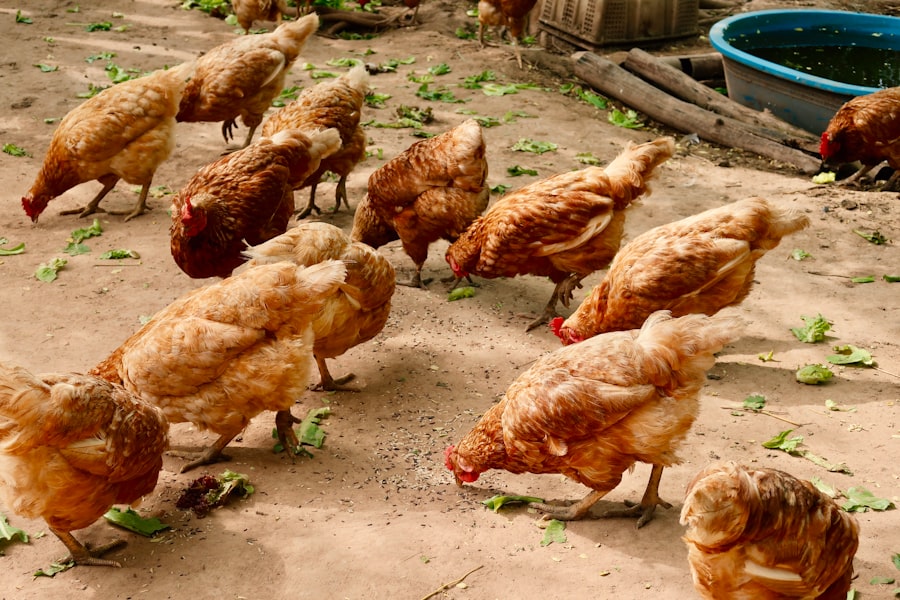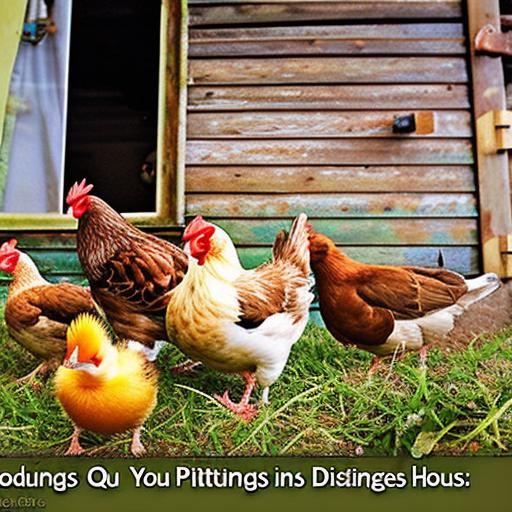Keeping chickens in your house may seem like a fun and unique idea, but it’s important to consider the health risks associated with this practice. While chickens can make great pets and provide fresh eggs, they can also carry diseases that can be harmful to humans. In this article, we will explore the various health risks of keeping chickens indoors and why it may not be worth the potential dangers.
Key Takeaways
- Keeping chickens in your house poses health risks.
- Salmonella infection is a common risk associated with keeping chickens indoors.
- Avian influenza is another risk associated with keeping chickens indoors.
- Allergic reactions and respiratory problems are also risks associated with keeping chickens indoors.
- Using chicken coops is a safer alternative to keeping chickens in your house.
Health Risks Associated with Keeping Chickens in Your House
Chickens can carry diseases that can be harmful to humans. One of the most common diseases associated with chickens is salmonella. Salmonella is a type of bacteria that can cause food poisoning in humans. It can be transmitted through contact with chicken feces, feathers, or contaminated surfaces. Young children, the elderly, and those with weakened immune systems are particularly at risk for salmonella infection.
Another health risk associated with keeping chickens indoors is avian influenza, also known as bird flu. Avian influenza is a viral infection that primarily affects birds but can also be transmitted to humans. It can cause severe respiratory illness and even death in some cases. The virus is usually spread through contact with infected birds or their droppings.
Risk of Salmonella Infection
Salmonella is a type of bacteria that can cause illness in humans. It is commonly found in the intestines of chickens and can be transmitted to humans through contact with contaminated surfaces or by consuming undercooked chicken or eggs. Symptoms of salmonella infection include diarrhea, fever, and abdominal cramps.
Young children, the elderly, and those with weakened immune systems are particularly at risk for salmonella infection. For these individuals, the infection can be more severe and may require medical treatment. It’s important to practice good hygiene when handling chickens or their eggs to reduce the risk of salmonella infection.
Risk of Avian Influenza
Avian influenza, also known as bird flu, is a viral infection that primarily affects birds but can also be transmitted to humans. It can cause severe respiratory illness and even death in some cases. The virus is usually spread through contact with infected birds or their droppings.
Avian influenza can be a serious illness and should not be taken lightly. Symptoms of avian influenza in humans include fever, cough, sore throat, and muscle aches. In severe cases, it can lead to pneumonia and respiratory failure. It’s important to avoid close contact with sick or dead birds and to practice good hygiene to reduce the risk of avian influenza.
Risk of Allergic Reactions
Some people may be allergic to chickens or their feathers. This can cause respiratory problems such as wheezing, coughing, and shortness of breath. In severe cases, it can lead to anaphylaxis, a life-threatening allergic reaction.
If you or someone in your household has a known allergy to chickens or feathers, it’s important to avoid keeping chickens indoors. Even if you don’t have a known allergy, it’s still possible to develop an allergic reaction over time with repeated exposure to chickens or their feathers.
Risk of Respiratory Problems

Chickens produce dust and dander that can irritate the lungs. This can lead to respiratory problems, especially in those with pre-existing conditions like asthma. The dust and dander can trigger asthma attacks and make breathing difficult for those with respiratory conditions.
If you or someone in your household has asthma or other respiratory conditions, it’s important to avoid keeping chickens indoors. The dust and dander produced by chickens can worsen symptoms and make it harder to manage respiratory conditions.
Risk of Property Damage
Chickens can be messy and destructive. They have a natural instinct to scratch the ground, which can lead to damage to floors, furniture, and other household items. They can also leave droppings throughout the house, which can be difficult to clean up and can cause stains and odors.
If you decide to keep chickens indoors, it’s important to provide them with a designated area that is easy to clean and maintain. This can help minimize the risk of property damage and make it easier to keep your house clean.
Risk of Infestation
Keeping chickens indoors can attract pests like mites and lice. These pests can infest the chickens and spread throughout your house, causing further health risks. Mites and lice can bite humans and cause itching, redness, and irritation.
Controlling pests in an indoor environment can be challenging. It often requires professional pest control services to effectively eliminate the infestation. If you decide to keep chickens indoors, it’s important to take proactive measures to prevent pests and regularly inspect your chickens for signs of infestation.
Benefits of Using Chicken Coops
While keeping chickens indoors is not recommended due to the health risks involved, there are still benefits to raising chickens in a safe and appropriate environment. Chicken coops provide a safe and healthy space for chickens to live. They offer protection from predators, provide adequate ventilation, and allow for easy cleaning.
chicken coops also help contain the mess and prevent property damage. They provide a designated area for chickens to scratch and roam, reducing the risk of damage to floors, furniture, and other household items. Additionally, chicken coops make it easier to manage pests and prevent infestations.
Keeping Chickens in Your House is Not Worth the Risk
While keeping chickens in your house may seem like a fun idea, the health risks associated with this practice outweigh the benefits. Chickens can carry diseases that can be harmful to humans, such as salmonella and avian influenza. They can also cause allergic reactions and respiratory problems.
Chickens can be messy and destructive, and keeping them indoors can attract pests like mites and lice. It’s important to consider these risks before deciding to keep chickens indoors. Instead, consider using a chicken coop to provide a safe and healthy environment for your chickens. A chicken coop can help minimize the health risks and provide a better living space for your feathered friends.
If you’re considering keeping chickens in your house, it’s important to be aware of the potential dangers and challenges that come with it. While chickens can make great pets and provide fresh eggs, they also require proper housing and care. To learn more about the risks involved in keeping chickens indoors, check out this informative article on the dangers of keeping chickens in your house. It discusses the potential health hazards, hygiene concerns, and the importance of providing a suitable living environment for your feathered friends. For more insights on poultry breeding and housing options, you may also find these related articles on guinea fowl egg laying and quail egg incubation helpful. Additionally, if you’re looking for a reliable chicken coop solution, consider exploring the features and benefits of the SnapLock Chicken Coop.
FAQs
What are the dangers of keeping chickens in your house?
There are several dangers associated with keeping chickens in your house, including the risk of disease transmission, property damage, and potential legal issues.
Can chickens transmit diseases to humans?
Yes, chickens can transmit diseases to humans, including salmonella, campylobacter, and avian influenza. These diseases can cause serious illness and even death in some cases.
What kind of property damage can chickens cause?
Chickens can cause a variety of property damage, including scratching and pecking at furniture, walls, and flooring. They can also create a mess with their droppings and feathers.
Are there any legal issues with keeping chickens in your house?
Yes, there may be legal issues with keeping chickens in your house, depending on where you live. Some cities and towns have zoning laws that prohibit the keeping of livestock within city limits, including chickens.
What are some alternatives to keeping chickens in your house?
If you want to keep chickens but don’t want to keep them in your house, there are several alternatives. You can keep them in a backyard coop or in a designated area on your property. You can also consider joining a community garden or urban farming program that allows for the keeping of chickens.
Meet Walter, the feathered-friend fanatic of Florida! Nestled in the sunshine state, Walter struts through life with his feathered companions, clucking his way to happiness. With a coop that’s fancier than a five-star hotel, he’s the Don Juan of the chicken world. When he’s not teaching his hens to do the cha-cha, you’ll find him in a heated debate with his prized rooster, Sir Clucks-a-Lot. Walter’s poultry passion is no yolk; he’s the sunny-side-up guy you never knew you needed in your flock of friends!







